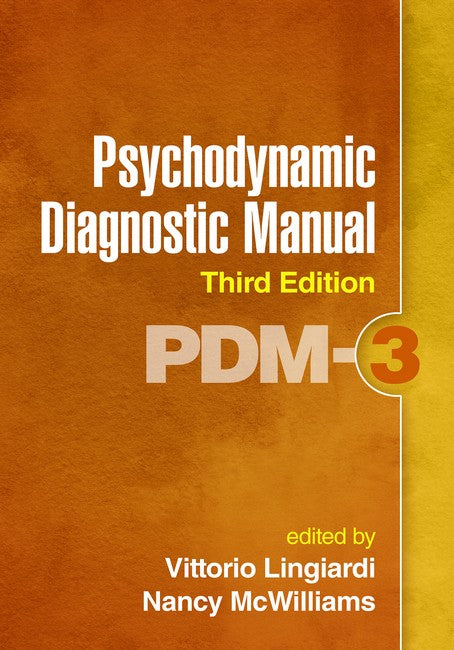Vittorio Lingiardi, MD, is a psychiatrist and psychoanalyst. He is Full Professor of Dynamic Psychology and past Director of the Clinical Psychology Specialization Program in the Faculty of Medicine and Psychology of Sapienza University of Rome in Italy. He is Senior Research Fellow in the Sapienza School for Advanced Studies and runs the Sapienza Counseling Hub for professors and administrative staff. Dr. Lingiardi's research interests include diagnostic assessment and treatment of personality disorders, process-outcome research in psychotherapy and psychoanalysis, and gender identity and sexual orientation. He is the author of several books and many articles published in leading international journals of psychiatry, psychotherapy, and psychoanalysis. Dr. Lingiardi has served as president (2020-2024) of the Society for Psychotherapy Research-Italy Area Group. He is the recipient of the Ralph Roughton Paper Award from the American Psychoanalytic Association, the Cesare Musatti Award from the Italian Psychoanalytic Society, the Research Award from the Society for Psychoanalysis and Psychoanalytic Psychology (Division 39 of the American Psychological Association), the Sigourney Award for Distinguished Contributions to Psychoanalysis, and the Scientific Dissemination Award from the Italian Psychological Association. Nancy McWilliams, PhD, ABPP, is Visiting Professor Emerita at the Graduate School of Applied and Professional Psychology at Rutgers, The State University of New Jersey, and has a private practice in Lambertville, New Jersey. She is author or editor of acclaimed books, including Psychoanalytic Diagnosis, Second Edition, and has published widely in professional journals. Dr. McWilliams is a past president of the Society for Psychoanalysis and Psychoanalytic Psychology, Division 39 of the American Psychological Association (APA). She is the recipient of honors including the Gradiva Award from the National Association for the Advancement of Psychoanalysis, the Erikson Scholar Award from the Austen Riggs Center, the Goethe Scholarship Award from the Section on Psychoanalytic and Psychodynamic Psychology of the Canadian Psychological Association, the Rosalee Weiss Award from the Division of Independent Practitioners of the APA, the Laughlin Distinguished Teacher Award from the American Society of Psychoanalytic Physicians, the Hans H. Strupp Award from the Appalachian Psychoanalytic Society, and the International, Leadership, and Scholarship Awards from APA Division 39. She is an honorary member of the American Psychoanalytic Association, the Institute for Psychoanalytic Psychotherapy of Turin, Italy, and the Warsaw Scientific Association for Psychodynamic Psychotherapy. Dr. McWilliams's writings have been translated into 20 languages.
Request Academic Copy
Please copy the ISBN for submitting review copy form
Description
"PDM-3 is far more useful in clinical practice than DSM-5 or ICD-10. Psychopathologies simply cannot be adequately conceptualized in purely nomothetic terms; to ignore the idiographic is to ignore the most essential feature of the mind--namely, that it is subjective. The inclusion of some neuropsychoanalytic constructs in this edition is a particularly welcome development."--Mark Solms, PhD, Co-Chair, International Neuropsychoanalysis Society "A landmark achievement. Fully revised, PDM-3 offers a comprehensive lifespan framework that captures the complexity of human functioning through a dimensional, person-centered lens. It integrates contemporary research--from neuroscience and outcome studies to cultural and developmental psychology--while remaining grounded in core psychodynamic traditions such as object relations, ego psychology, and relational theory. PDM-3 adds vital clinical nuance to classification by emphasizing subjective experience, developmental context, and therapeutic relevance, and by incorporating both nomothetic and idiographic perspectives. Ideal for graduate training in diagnosis and assessment, PDM-3 is clinically meaningful and empirically grounded, revitalizing psychodynamic assessment for today's mental health landscape."--Peter Lilliengren, PhD, Department of Psychology, Stockholm University, Sweden "Psychoanalysis is often akin to a Tower of Babel, with so many ways to describe a patient but without a unifying language that lets analysts around the world share and learn from each other's experiences. PDM offers a creative solution to this dilemma and an essential guiding frame for those learning the craft. It also offers a creative functional counterpoint to the push for categorical diagnoses, which too often overlook the rich nuance in an individual patient's struggles and needs. That PDM is now in its third edition speaks to how essential a role it already plays in sustaining and growing psychoanalytic practice around the world."--Linda C. Mayes, MD, Arnold Gesell Professor of Child Psychiatry, Pediatrics, and Psychology and Chair, Yale Child Study Center, Yale School of Medicine-The depth is impressiveaEUR|.Recommended. Upper-level undergraduates through professionals/practitioners. (on the second edition)--Choice Reviews, 11/1/2017AE'AE'No matter what your theoretical framework, this book and its ideas will work for you. Truly a mind-opening experience, and one which makes clinicians stop and think about their current therapeutic orientation. A must read for open-minded clinicians willing to go beyond the confines of the current diagnostic models. *****! (on the second edition)--Doody's Review Service, 7/28/2017

